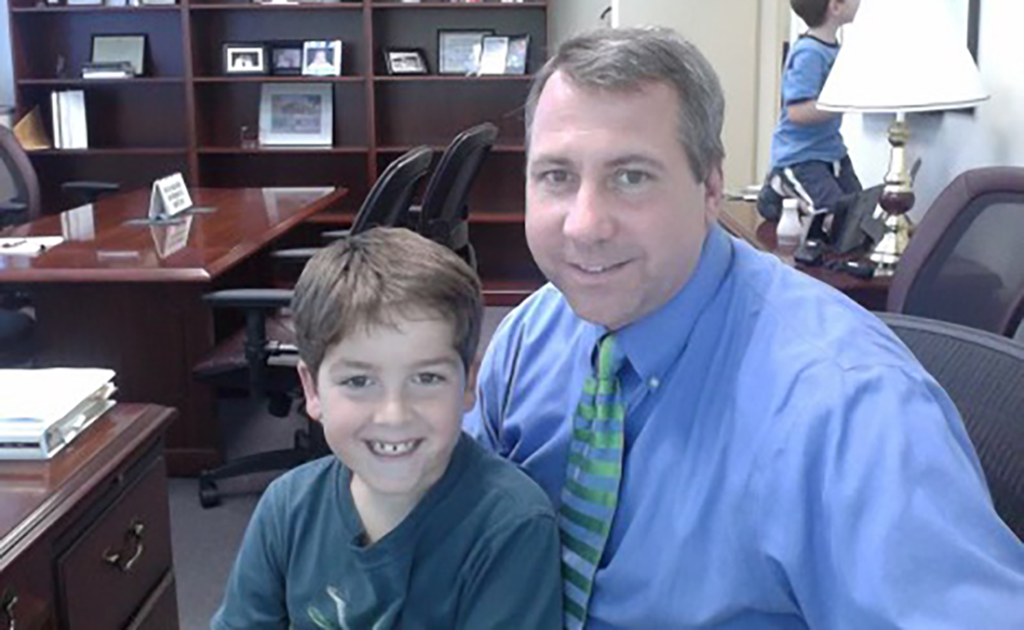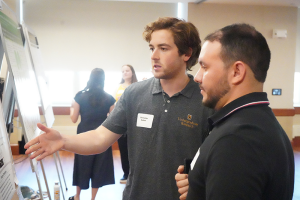
Maxwell Daubert, a senior majoring in biology with a minor in anthropology, grew up in an environment that fostered constant learning. Daubert, who moved to the Columbia area between his freshman and sophomore years of high school, spent a lot of time on college campuses throughout his childhood. He remembers these experiences fondly.
“I really enjoyed being around a college campus all my life,” Daubert said. “I always enjoyed the atmosphere – this kind of environment of learning as a lifestyle was really attractive to me. Maybe that’s because I was taught to love it from a young age.”
Daubert’s dad, Christopher Daubert, is the vice chancellor and dean of the University of Missouri College of Agriculture, Food and Natural Resources (CAFNR) and has conducted academic research for years. Daubert believes watching his dad do this sparked his interest in a future in academia.
“I knew (research) was a good focus area for people who like to learn, were really curious and enjoyed solving problems,” Daubert said. “So, I think my dad saw that I always liked biology growing up and loved learning about life. I was obsessed with animals and taxonomy and learning.”
Even before he enrolled as a student at Mizzou, Daubert was getting involved on campus. In high school, he was a camper at the CAFNR Life Sciences Quest program, a summer academy for students interested in the life sciences and their applications, including innovations in agriculture. There, he has served as a camp counselor over the past two summers. He also worked in research laboratories.
“I spent some summer time in plant science labs on campus in high school,” Daubert said. “I worked in Dr. Walter Gassmann’s lab over some summers and had a really good experience there.”
Daubert remembers Gassmann’s encouragement playing a part in encouraging him to stay involved in research at Mizzou in college. Gassmann is the director of the Bond Life Sciences Center and a professor of plant science and technology.
“(Gassmann) told me that I should apply for the Freshman Research In Plant Science Program (FRIPS),” Daubert said. “That was kind of my initial segue into specifically undergraduate research. They give you all the tools to understand what it’s like to be a successful undergrad in the lab, like learning how to read papers and giving you strategies to better present the dimensional research that you do.”

Daubert matched into this program with his current mentor, Scott Peck, a biochemistry professor who focuses on plant immunity toward bacterial pathogens. His lab investigates early plant defense signaling when encountering bacterial pathogens, and how plants might be adjusted to resist these infections.
“Undergraduate research has been really formative for me – I think in showing me how critical thinking applies to real-life problem solving,” Daubert said. “And also, just giving me friends who I can talk to about science and things that I’m passionate about.”
Daubert is also an Office of Undergraduate Research Ambassador at MU, where he hopes to encourage students to get involved in undergraduate research and help give them the tools to pursue research.
“That’s been such a great way to share what I’m passionate about,” Daubert said. “And to try to explain to people how valuable, reasonable and possible it is to become an undergraduate researcher, because I think some people are daunted by it.”
To help share this passion with future students, Daubert has volunteered with STEM Cubs. This is a program put on by Mizzou once a semester and seeks to expose elementary students, especially those within historically underrepresented communities, to hands-on STEM activities.
“If you’ve been looking for a way to give back to the local community, participating in STEM Cubs as an instructor or a volunteer is a great way to do that,” Daubert said.
Daubert’s interest areas extend beyond his major. He recalled two Honors Humanities Sequence courses, “Epic Destinies, Individual Journeys” and “Diagnosing the Dark,” as being some of his favorite classes.
“I think I just wanted to get a better understanding of where the modern saga of literature and our understanding of the world both come from,” Daubert said. “So having that historical background of where thought began, or where modern thinking began, both during and following the height of Athens is really interesting.
“I also really liked … ‘Diagnosing the Dark’ because that was where you read some of the more modern pieces and learned things like how people reconciled with modern technology after the Holocaust and how people understand human nature.”
On campus, Daubert is involved in Tri Beta, a biology honor society, where he currently serves as the vice president of membership for the organization.
“I really enjoyed the networking and community building, I think, when I first joined,” he said. “Biology is a really broad field and some people want to go into medicine, some people want to do research for a living … just the Mizzou community, in general, is such an excellent place to be a part of.”
During his junior year, Daubert got involved in the Missouri Students Association, where he sought to gain a better understanding of science communication and policy.
“Science policy is becoming increasingly important with an increasingly technological and scientific world,” Daubert said. “So, I was hoping to get a better understanding of policy and MSA was really good for that.”
As he looks to the future, Daubert hopes learning remains a large part of his life.
“I definitely am really passionate about education, I really enjoy teaching,” Daubert said. “I think I would enjoy teaching in higher education, with an end goal of maybe doing research as well. Maintaining my involvement in the university environment – for me, being at a university kind of makes life worth living, if that makes sense. I love it too much.”
Daubert credits the Honors College with playing a large part in his Mizzou experience, too.
“I absolutely feel like the Honors College has been so instrumental in my learning experience here,” he said. “It emphasizes learning as an endeavor and an experience that can make you into a more holistic individual as opposed to getting marks … the Honors College does a great job at really crafting a learning experience around how fun it can be to learn.”
As Daubert, who will graduate in May, reflects on his experience at Mizzou, he wants to emphasize to other students the importance of finding connections on campus.
“It always pays off to reach your hand out and meet somebody,” he said. “I was way more introverted before I entered college. Pursuing connections is a really worthwhile thing; it’ll give you more perspective on yourself and the things you want to do and give you people to talk to, people to rely on, people who can rely on you.
“One thing about having connections with students and faculty members in the Honors College is that people are always pushing you collaboratively to be a better version of yourself and prioritizing your learning. I would say they make me more excited to pursue hard goals that take a lot of thinking.”